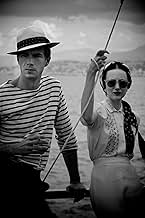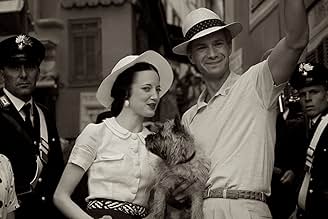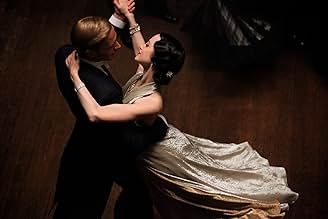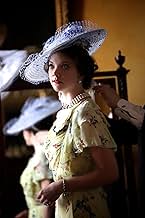NOTE IMDb
6,2/10
14 k
MA NOTE
L'affaire entre le roi Édouard VIII et la divorcée américaine Wallis Simpson, et une romance contemporaine entre une femme mariée et un agent de sécurité russe.L'affaire entre le roi Édouard VIII et la divorcée américaine Wallis Simpson, et une romance contemporaine entre une femme mariée et un agent de sécurité russe.L'affaire entre le roi Édouard VIII et la divorcée américaine Wallis Simpson, et une romance contemporaine entre une femme mariée et un agent de sécurité russe.
- Réalisation
- Scénario
- Casting principal
- Nommé pour 1 Oscar
- 4 victoires et 6 nominations au total
Avis à la une
The cast alone makes this film worth watching. This was the first I watched with Oscar Isaac, and he truly generates heat in every scene with Abbi Cornish. Andrea Riseborough gives a star making performance that should have been recognized when the film was originally released. Madonna, as a director, knows how to let her cast do their thing and brings a stylish eye to the set design and costumes. Of course the critics were ready with their claws out but anyone who watches the film with an objective eye will be pleasantly rewarded.
Having finally opened in the UK, I've now had the opportunity to watch 'W.E.', having followed its coverage to this point with interest. I can't, in all honestly, say that this is a good movie. I'll back the common positives and reiterate that it looks amazing and Andrea Riseborough is wonderful in it. The score, while lovely, is over- powering at times - Madonna is obviously terrified of silence!
I went with the movie quite happily for the first hour. The Wallis and Edward scenes are effective (I thought the dizzying/choppy camera work worked really well contrasting with the vintage images) and reminded me quite a bit of Stephen Fry's movie "Bright Young Things". But they had absolutely zero dramatic tension. Largely, this was due to the fact that they weren't chronological, but also it was because (to my horror) they almost seemed there to serve the modern day story, rather than vice versa.
And as for those modern day parts ... well ... Firstly, I'll say that I didn't think the concept was bad and it had potential. However, they needed to be trimmed by about three quarters. Christ, did they ever go on. The dialogue was serviceable, at best, and toe-curling at worst. The character of Wally was about as engaging as a paper clip and that was largely due to Abby Cornish's lifeless performance. Honestly, I wanted to scream at the screen, "Stop whispering all the time and TALK, woman!" That said, if the movie had only cut to these scenes every so often and used them as well-timed interjections, rather than as a story worthy of screen time in their own right, it would have been more bearable.
The film really lost me in the second hour when I realised it had used up all its party tricks and it was obvious where it was going. (And, no, I don't mean the Wallis/Edward story arch, but how it was going to contrast the two tales, and what the oh-so-obvious climax was going to be.) By the end, I couldn't wait for it to finish.
There are some lovely scenes, though, and several nice touches throughout. But while the infamous 'Pretty Vacant' sequence is probably trying to say profound things about Wallis having a punk spirit, it feels rather out of place. (It's fun, though, I'll give it that.)
So, really, it's nowhere near the one star disaster many are claiming. And I, genuinely, can't see why anyone could charge it would be, other than to appear 'cool' to knock Madge. It's got too much going for it, for that.
But the reason I said 'semi-noble failure' is because, while I think it had some ambition, it's indulgent to a fault. At least twenty minutes of this movie are taken up by Abby Cornish wandering around Sothebys, exchanging in vacant platitudes with the Russian security guard, or looking blandly at something we're told should be exciting by the volume of the score. And, I guess, the blame for including such non-interesting stuff must lie with the movie's director.
I went with the movie quite happily for the first hour. The Wallis and Edward scenes are effective (I thought the dizzying/choppy camera work worked really well contrasting with the vintage images) and reminded me quite a bit of Stephen Fry's movie "Bright Young Things". But they had absolutely zero dramatic tension. Largely, this was due to the fact that they weren't chronological, but also it was because (to my horror) they almost seemed there to serve the modern day story, rather than vice versa.
And as for those modern day parts ... well ... Firstly, I'll say that I didn't think the concept was bad and it had potential. However, they needed to be trimmed by about three quarters. Christ, did they ever go on. The dialogue was serviceable, at best, and toe-curling at worst. The character of Wally was about as engaging as a paper clip and that was largely due to Abby Cornish's lifeless performance. Honestly, I wanted to scream at the screen, "Stop whispering all the time and TALK, woman!" That said, if the movie had only cut to these scenes every so often and used them as well-timed interjections, rather than as a story worthy of screen time in their own right, it would have been more bearable.
The film really lost me in the second hour when I realised it had used up all its party tricks and it was obvious where it was going. (And, no, I don't mean the Wallis/Edward story arch, but how it was going to contrast the two tales, and what the oh-so-obvious climax was going to be.) By the end, I couldn't wait for it to finish.
There are some lovely scenes, though, and several nice touches throughout. But while the infamous 'Pretty Vacant' sequence is probably trying to say profound things about Wallis having a punk spirit, it feels rather out of place. (It's fun, though, I'll give it that.)
So, really, it's nowhere near the one star disaster many are claiming. And I, genuinely, can't see why anyone could charge it would be, other than to appear 'cool' to knock Madge. It's got too much going for it, for that.
But the reason I said 'semi-noble failure' is because, while I think it had some ambition, it's indulgent to a fault. At least twenty minutes of this movie are taken up by Abby Cornish wandering around Sothebys, exchanging in vacant platitudes with the Russian security guard, or looking blandly at something we're told should be exciting by the volume of the score. And, I guess, the blame for including such non-interesting stuff must lie with the movie's director.
The much maligned, brief theatrical film by Madonna - W.E. - fairs better on the small screen than it likely did in the movie houses. The stories are bifurcated, each one resembling a television creation - one a docudrama biopic, the other a contemporary soap opera. That Madonna, who directed and wrote the screenplay with Alek Keshishian, decided to mix the two stories is a bit daring but in some ways it works very well. In other ways the parallel stories seem like time traveling cars on the same highway that never quite travel at the same speed or quality.
The film mixes the notorious affair between King Edward VIII and American divorcée Wallis Simpson with a contemporary romance between a married woman and a Russian security guard. The time is 1998 and at an auction of the estate of the Duke and Duchess of Windsor unhappily married ex-Sotheby employee Wally Winthrop (Abbie Cornish) becomes obsessed by their historic love story. Her own marriage to womanizing, abusive psychiatrist William (Richard Coyle) undermines her feelings of worth and as she learns more about the sacrifices involved in the famous affair, she gains her own courage to find happiness.
The film flips back and forth between the present and the 1930s and it is the historical aspect of the film that is almost flawless. We get to know Wallis Simpson (in a brilliant portrayal by Andrea Riseborough) and understand her failed first two marriages (at the time we meet her she is still married to Ernest Simpson played by David Harbour), and see the American sizzle that made her the talk of England. When Wallis wrangles her way to meet Prince Edward, better known as David, (James D'Arcy) there is a chemistry that develops to the point of passion and ultimately leads to Wallis divorcing Ernest to marry Edward - a deed that leads to Edward's abdication of the throne for 'the woman I love', which he had assumed when King George V (James Fox) dies, to his stammering brother Bertie (Laurence Fox) and his caustic wife Elizabeth (Natalie Dormer). The paparazzi make their life miserable and the couple is not allowed to return to England until Edward dies, with the faithful Wallis supportively by his side through 36 years of marriage.
Wally - meanwhile - longs to be pregnant but sustains such abuse from William that she ultimately yields to the loving friendship the auction house Russian security guard Evgeni (Oscar Isaac) and begins her life again. The two stories are connected by Wally's obsession with the royal couple's notorious affair and at auction's end she is given access to private letters between Wallis and Edward that have been in the possession of Mohamed Al-Fayed (Haluk Bilginer) - a tacked on ending that feels ill at ease and redundant.
Everyone connected t the biopic angle of this film is excellent and Madonna shows that she knows how to direct affairs of the heart in a royal situation very well indeed. Both Andrea Riseborough and James D'Arcy are superb and the costumes and music and cinematography of this historical portion are exceptionally well done. Though the idea of the contemporary sluggish story is reasonable, Abbie Cornish seems uncomfortable with the script: Oscar Isaac shines as her new love. In all the film, though spotty, has merit and it not a bad debut for Madonna as director.
Grady Harp
The film mixes the notorious affair between King Edward VIII and American divorcée Wallis Simpson with a contemporary romance between a married woman and a Russian security guard. The time is 1998 and at an auction of the estate of the Duke and Duchess of Windsor unhappily married ex-Sotheby employee Wally Winthrop (Abbie Cornish) becomes obsessed by their historic love story. Her own marriage to womanizing, abusive psychiatrist William (Richard Coyle) undermines her feelings of worth and as she learns more about the sacrifices involved in the famous affair, she gains her own courage to find happiness.
The film flips back and forth between the present and the 1930s and it is the historical aspect of the film that is almost flawless. We get to know Wallis Simpson (in a brilliant portrayal by Andrea Riseborough) and understand her failed first two marriages (at the time we meet her she is still married to Ernest Simpson played by David Harbour), and see the American sizzle that made her the talk of England. When Wallis wrangles her way to meet Prince Edward, better known as David, (James D'Arcy) there is a chemistry that develops to the point of passion and ultimately leads to Wallis divorcing Ernest to marry Edward - a deed that leads to Edward's abdication of the throne for 'the woman I love', which he had assumed when King George V (James Fox) dies, to his stammering brother Bertie (Laurence Fox) and his caustic wife Elizabeth (Natalie Dormer). The paparazzi make their life miserable and the couple is not allowed to return to England until Edward dies, with the faithful Wallis supportively by his side through 36 years of marriage.
Wally - meanwhile - longs to be pregnant but sustains such abuse from William that she ultimately yields to the loving friendship the auction house Russian security guard Evgeni (Oscar Isaac) and begins her life again. The two stories are connected by Wally's obsession with the royal couple's notorious affair and at auction's end she is given access to private letters between Wallis and Edward that have been in the possession of Mohamed Al-Fayed (Haluk Bilginer) - a tacked on ending that feels ill at ease and redundant.
Everyone connected t the biopic angle of this film is excellent and Madonna shows that she knows how to direct affairs of the heart in a royal situation very well indeed. Both Andrea Riseborough and James D'Arcy are superb and the costumes and music and cinematography of this historical portion are exceptionally well done. Though the idea of the contemporary sluggish story is reasonable, Abbie Cornish seems uncomfortable with the script: Oscar Isaac shines as her new love. In all the film, though spotty, has merit and it not a bad debut for Madonna as director.
Grady Harp
I will not be revealing any spoilers. I just want to highlight the fact that I can now confirm for myself that critics are jaded and they will write off anything Madonna does in the film business. That is not to say most of her previous works weren't dismal at best, but I always felt they weren't as bad as critics bashed.
However, we're here to discuss W.E. A film that Madonna does not star in and that may just be the brilliance of it all. I screened it last night after winning a contest and I must say, as a Madonna fan, I walked in with the assumption that I wouldn't like the movie but I would search for little things that I could enjoy and emphasize those things. That had to be the last thing in the world I did once the film commenced. Even in the same room with Madonna and other fashionistas, celebrities and artists, I completely forgot where I was and I soon found myself captivated by the story.
The intertwining of the old and new, historical loosely based romance with a modern romance, music old and new was brilliantly executed by Madonna. The film really emphasized how the general public scrutinize public figures and demonize others without a clear understanding of who they are and how politics can destroy the chance of love and how King Edward would ultimately not have that.
Intertwined with the modern tale of a New York City woman who's fascinated by the story, there are flashbacks that go through the delicate history of the royal family in the particular time that Wallis Simpson, then married, met King Edward.. It is not a fact-by-fact story. It is an attempt to take a look at things from a different perspective because after all there are two sides to every story, if not more than two sides.
Although set design, location and costume design were unbelievable, I will not speak further on it because critics said that that was the only thing good about the film so I'll let that speak for itself.
Every character was played and executed brilliantly and it was just a captivating story from beginning to end. I take pride in my love for Madonna but I also take pride in my love for film and I walked in knowing I wouldn't lie to myself. If I liked it, I liked it. If I loved it, then so be it. If I hated it, oh well.
Fortunately, I found that everyone in the audience was pleasantly surprised, almost as if they were cheering on the fact that it will be seen for what it is. That no one has to defend it. Leave it to the film-goer to make that desicion.
The camera work was beautiful, slow but intermixed with a haunting score and pivotal performances. I really hope people watch it with an open mind and forget Madonna directed it. At least until the credits roll and her new song Masterpiece begins and you remember why we love Madonna in the first place. Her music is profound and the song Masterpiece is a beautiful closer to the film.
After the film, everyone was energized and the buzz carried out into the halls where people stood discussing the film. I can't wait to re-watch it with my friends on Friday for its limited release and then once more at opening night on February 3rd.
I will be buying this film for my DVD collection. It's worth it and that's more than I thought I'd ever say about it.
***1/2(out of 5)
However, we're here to discuss W.E. A film that Madonna does not star in and that may just be the brilliance of it all. I screened it last night after winning a contest and I must say, as a Madonna fan, I walked in with the assumption that I wouldn't like the movie but I would search for little things that I could enjoy and emphasize those things. That had to be the last thing in the world I did once the film commenced. Even in the same room with Madonna and other fashionistas, celebrities and artists, I completely forgot where I was and I soon found myself captivated by the story.
The intertwining of the old and new, historical loosely based romance with a modern romance, music old and new was brilliantly executed by Madonna. The film really emphasized how the general public scrutinize public figures and demonize others without a clear understanding of who they are and how politics can destroy the chance of love and how King Edward would ultimately not have that.
Intertwined with the modern tale of a New York City woman who's fascinated by the story, there are flashbacks that go through the delicate history of the royal family in the particular time that Wallis Simpson, then married, met King Edward.. It is not a fact-by-fact story. It is an attempt to take a look at things from a different perspective because after all there are two sides to every story, if not more than two sides.
Although set design, location and costume design were unbelievable, I will not speak further on it because critics said that that was the only thing good about the film so I'll let that speak for itself.
Every character was played and executed brilliantly and it was just a captivating story from beginning to end. I take pride in my love for Madonna but I also take pride in my love for film and I walked in knowing I wouldn't lie to myself. If I liked it, I liked it. If I loved it, then so be it. If I hated it, oh well.
Fortunately, I found that everyone in the audience was pleasantly surprised, almost as if they were cheering on the fact that it will be seen for what it is. That no one has to defend it. Leave it to the film-goer to make that desicion.
The camera work was beautiful, slow but intermixed with a haunting score and pivotal performances. I really hope people watch it with an open mind and forget Madonna directed it. At least until the credits roll and her new song Masterpiece begins and you remember why we love Madonna in the first place. Her music is profound and the song Masterpiece is a beautiful closer to the film.
After the film, everyone was energized and the buzz carried out into the halls where people stood discussing the film. I can't wait to re-watch it with my friends on Friday for its limited release and then once more at opening night on February 3rd.
I will be buying this film for my DVD collection. It's worth it and that's more than I thought I'd ever say about it.
***1/2(out of 5)
I suppose there is the germ of a good idea here, and 2011's "W.E." is not unsuccessful. As a directing effort by Madonna, it's okay. And you have to give her credit since she had to know everyone would be gunning for her.
In 1998, the estate of the Duke and Duchess of Windsor goes up for auction. One person particularly interested in it is Wally Winthrop (Abbie Cornish), who is very taken with the love story between Wallis Simpson and the Duke of Windsor, and particularly Wallis' life and other marriages. The film takes us through the courtship and marriage of the Duke and Duchess as well as Wally's disintegrating marriage to William, and then her relationship with the Soviet security guard she meets at the auction house.
Personally I've never found anything romantic or sympathetic about Wallis and David. I think Wallis was a great excuse for David to duck responsibility and heap it onto his stammering brother. And neither he nor Wallis thought about what they were going to do once they were married. And what did they do? Roamed the world, showing up at a location when it was in season, and making friends who would write books about them after they died. By the time the couple realized what they had done, it was too late. No breaking up the great romance.
Nevertheless, as many times as their story has been told, it's still fascinating, and much more interesting than the marriage of Wally Winthrop and her husband. Not to mention, there is a fantastic performance by Andrea Risborough as Wallis. As Edward, James D'Arcy is incredibly dashing and attractive. It's really the stronger story, and Madonna might have been better off just telling their tale, using a different point of view than others have in the past.
The moral seems to be to take a risk and go for happiness. It's a fine moral; I'm just not sure I would use the Duke and Duchess of Windsor as inspiration. Was theirs a great love story? I'm sure it was, and no doubt the Duke's death hit the Duchess very hard. But they were human beings who undoubtedly fought, took one another for granted, and had some misgivings. And that's the big problem with idealizing any romance - in the end, the people we idealize are too much like us.
In 1998, the estate of the Duke and Duchess of Windsor goes up for auction. One person particularly interested in it is Wally Winthrop (Abbie Cornish), who is very taken with the love story between Wallis Simpson and the Duke of Windsor, and particularly Wallis' life and other marriages. The film takes us through the courtship and marriage of the Duke and Duchess as well as Wally's disintegrating marriage to William, and then her relationship with the Soviet security guard she meets at the auction house.
Personally I've never found anything romantic or sympathetic about Wallis and David. I think Wallis was a great excuse for David to duck responsibility and heap it onto his stammering brother. And neither he nor Wallis thought about what they were going to do once they were married. And what did they do? Roamed the world, showing up at a location when it was in season, and making friends who would write books about them after they died. By the time the couple realized what they had done, it was too late. No breaking up the great romance.
Nevertheless, as many times as their story has been told, it's still fascinating, and much more interesting than the marriage of Wally Winthrop and her husband. Not to mention, there is a fantastic performance by Andrea Risborough as Wallis. As Edward, James D'Arcy is incredibly dashing and attractive. It's really the stronger story, and Madonna might have been better off just telling their tale, using a different point of view than others have in the past.
The moral seems to be to take a risk and go for happiness. It's a fine moral; I'm just not sure I would use the Duke and Duchess of Windsor as inspiration. Was theirs a great love story? I'm sure it was, and no doubt the Duke's death hit the Duchess very hard. But they were human beings who undoubtedly fought, took one another for granted, and had some misgivings. And that's the big problem with idealizing any romance - in the end, the people we idealize are too much like us.
Le saviez-vous
- AnecdotesFashion house Christian Dior recreated three dresses for this film that it had previously made for the real Wallis Simpson.
- GaffesIn the newsreel scene from 1936 showing the funeral procession of Edward's father the King, the voiceover announcer says that "King George the Third has died and the nation mourns". It should of course have been King George the Fifth.
- Citations
Wallis Simpson: Darling, they can't hurt you if you don't let them.
- ConnexionsFeatured in Breakfast: Épisode datant du 3 septembre 2011 (2011)
- Bandes originalesKarin
Written by Christoph Clöser, Morten Gass
Performed by Bohren & Der Club of Gore
Published by Manuskript © (P) Bohren & Der Club of Gore released under exclusive license by [Pias] Recordings 2008
Meilleurs choix
Connectez-vous pour évaluer et suivre la liste de favoris afin de recevoir des recommandations personnalisées
- How long is W.E.?Alimenté par Alexa
Détails
- Date de sortie
- Pays d’origine
- Sites officiels
- Langues
- Aussi connu sous le nom de
- Chuyện Tình Thế Kỷ
- Lieux de tournage
- Sociétés de production
- Voir plus de crédits d'entreprise sur IMDbPro
Box-office
- Budget
- 15 000 000 $US (estimé)
- Montant brut aux États-Unis et au Canada
- 583 455 $US
- Week-end de sortie aux États-Unis et au Canada
- 47 074 $US
- 5 févr. 2012
- Montant brut mondial
- 2 042 203 $US
- Durée1 heure 59 minutes
- Couleur
- Mixage
- Rapport de forme
- 2.35 : 1
Contribuer à cette page
Suggérer une modification ou ajouter du contenu manquant











































